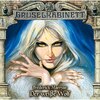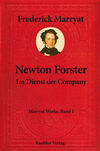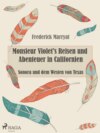Buch lesen: «Percival Keene», Seite 25
Chapter Thirty Four
As soon as I was at home again, the events of the day, from association of ideas, naturally brought Minnie Vanderwelt into my head, and I recollected that I had not written to her since my promotion and appointment to the Circe; I therefore sat down and indited a long letter, ending with expressing my regret at not having received an answer from the many I had written, especially the last, which informed them of my arrival in England, and gave them the knowledge where to address me. I also requested to know what had become of young Vangilt, whose escape I had contrived. Having enclosed that letter to the agent, and begged him to have it forwarded to Hamburg, I went to bed, and, after the excitement of the day, had a variety of dreams, in which Minnie’s form was continually making its appearance.
The following morning brought me a long letter from my aunt, Mrs Bridgeman, very lively and very amusing: the only news in it was the marriage of Lieutenant Flat to a tavern-keeper’s daughter, which had given great offence to the marine corps, as she was said to be rather light of carriage. She begged me very much to pay them a visit, but that was not all to my wishes, I most candidly confess. My pride revolted at it; I even doubt if I would have fitted out a ship at Chatham where people could point their finger at me, and say—That post-captain’s father was a marine in those barracks. Another letter from Lord de Versely, announcing his arrival at Madeline Hall, and requesting me to join him as soon as possible, was infinitely more to my taste, and I resolved to start next day, which I did. I was very cordially received by his lordship, and very graciously by the old lady, who expressed a hope that I would now make a long visit. About an hour after I had arrived, Colonel Delmar made his appearance: he was a cousin of Lord de Versely’s, but I certainly should not, from his appearance, have supposed him to be a Delmar: for he was short, round-shouldered, and with a fat, rubicund face, apparently about forty years of age. I observed, after our introduction, that his eyes were very often directed towards me; but his manner was courteous, and, although his appearance at first sight was not prepossessing, his conversation was very agreeable, and he was very gentleman-like. Before dinner was over, I felt a great liking for him.
As the first of September had not yet arrived, the birds had still two days of peace and quietness, leading their broods through the stubbles, and pointing out to them the corn which had spilled on the ground, for their food. That the old birds had some idea of a gun, it is to be supposed, from their having escaped the season before; but the young coveys had still that pleasure to come; in two days more they were to be initiated into the astonishing fact, that fast as feathers could fly, lead could fly faster, and overtake them.
The two or three days before the shooting season begins are invariably very tedious in the country, and I passed my morning chiefly in roaming through the park and pleasure grounds, and I hardly need say that, during those rambles, my thoughts were chiefly occupied with the intimacy which had taken place between my mother and Lord de Versely. On the third morning after my arrival I had been strolling for more than two hours, when I came to a very retired sort of Gothic cell, formed of the distended limbs of an old oak, intermixed with stones and grass. It faced towards the park, and was built up on the green lawn amidst clumps of laurel and other evergreens. I threw myself on the benches. It was just the place for a man to select for a rendezvous: just the secret spot where a maiden could listen without trembling at intruders; and it struck me that this must have been the trysting place of my parents. For an hour I remained there, castle-building for the future, and musing on the past, when I heard a voice, close to me on the other side of the cell, the back of which was turned towards the hall. I knew the voice to be that of the old lady, who, it appears, had, as usual, come out in her garden chair, and was dragged by her attendant, Phillis: the wheels had made no noise on the velvet lawn, and, until roused by her voice, I was not aware of their approach.
“Nonsense, Phillis; why, child, what should you know about such things?” said the old lady.
“If you please to recollect, ma’am,” replied Phillis, who certainly was old enough to recollect all the passages in a woman’s life, “I was your maid at the time that it happened, and I was constantly in company with Bella Mason. She was very respectful towards you, but you did not know what her temper was; there never was so proud a young woman, or who considered herself of such consequence as she did—so much so, that she treated even Mr Jonas, the butler, and Mrs Short, the housekeeper, with disdain.”
“Well, well, I know that she was proud; her mother was always a proud woman. Mr Mason, in his younger days, held property of his own, at least his father did, but he ran through it revelling and horse-racing; but what does that prove?”
“I only say, madam, what was said at the time by everybody, that Bella Mason never would have married that marine, whom she looked upon with contempt, although he certainly was a good-looking young man, if she had not been obliged to do so.”
“But why obliged, Phillis?”
“To conceal her shame, madam; for, if you recollect, the child was born three months after marriage.”
“I recollect that, very well,” replied Miss Delmar; “it was a sad thing, and, as my nephew said, I ought to have looked out sharper after Bella than I did, and not have allowed her to be so much in company with that marine.”
“That marine, ma’am! he was innocent enough; Bella was not likely to listen to one like him.”
“Who can you mean then, Phillis?”
“Why, Lord de Versely, ma’am, to be sure. Everybody in the Hall was sure the child was his; he and Bella were for ever together for months before her marriage.”
“Phillis, Phillis, you don’t know what you are saying—it’s impossible; indeed, I recollect talking the matter over with Lord de Versely, who was then Captain Delmar, and he was more shocked at the impropriety than even I was, and offered to give the marine a good whipping.”
“That may be, madam, but still Captain Delmar was the father of that boy; for, if you recollect, old Mrs Mason came to the Hall, and went away almost immediately.”
“Well, what of that? she was displeased no doubt.”
“Yes, indeed she was, madam; but she had a private meeting with Captain Delmar; and Mrs Short, the housekeeper, overheard what passed, and I understand that the captain did not deny it to her. One thing is certain, that Mrs Mason, as she was going away, in her rage made use of language about Captain Delmar, which otherwise she never would have dared. And, then, madam, only look at Captain Keene,—why, he is the very image of his lordship.”
“He is very like him, certainly,” said the old lady, musing.
“And then, madam, do you think his lordship would have brought the boy up in the service, and made him a post-captain, if he had been the son of a marine? And then, madam, see how fond his lordship is of him; why, he dotes upon him; and would he ask the son of his own servant to come down to Madeline Hall, as fit company for you? No; so, madam, depend upon it, Captain Keene is a Delmar, and no wonder his lordship is so fond of him, madam; for he is his only child, and I dare say his lordship would give him his right hand if he could leave him the barony and estates, instead of them going away, as they will, to his younger brother’s children.”
“Well, well, Phillis, it may be so. I don’t know what to think of it. I shall speak to Lord de Versely about it; for if Captain Keene is a Delmar, he must be looked to. He is a Delmar, although with the bar sinister. I feel a little cold, Phillis, so drag me to the terrace, that I may get a little sunshine.”
Phillis, I thank thee, said I to myself, as the chair wheeled away. Your love of chatting may be useful to me. Perhaps his lordship may now acknowledge my birth to his aunt, and good may come of it. I waited till the chair wheels were heard on the gravel walk, and then quitted the grotto, and bent my steps away from the Hall, that I might commune with my own thoughts without chance of interruption.
I had quitted the park, and was now pacing over several fields, one after another, walking as if I had some important business in hand, when in fact, my legs were only trying to keep pace with my thoughts, when I vaulted over a gate, and found myself in a narrow lane, sunk deep between two hedges. Indifferent as to the path I took, I turned to the right, and continued on my way, walking as fast as before, when I heard the low bellowing of an animal. This induced me to raise my eyes, and I witnessed a curious scene in front of me, which I will narrate in the next chapter.
Chapter Thirty Five
As I said before, the lane was very narrow, not admitting more than one vehicle to go along it, and was sunk between the hedges on each side, so as to render it not very easy to climb up the bank. The parties who presented themselves were, first a cow with her tail turned towards me, evidently a wicked one, as she was pawing and bellowing in a low tone, and advancing towards two people who were the object of her attack. One was a very little man, dressed in black, the other a stout burly young fellow in a shooting-jacket; but what amused me most was, that the stout young fellow, instead of being in the advance to defend one so much smaller than himself, not only kept behind the little man, but actually now and then held him by the shoulders before his own person, as a shield to ward off the expected attack of the vicious animal. It is true that the little personage expostulated, and spoke several times in a tone of command to his companion, but his words were unheeded, and the cow advanced, and they retreated in the order which I have described.
I quickened my pace, so as to gain rapidly upon them, and was soon but a few yards from the animal. I had no stick or weapon of any kind, but still I knew how to manage unruly cattle as sailors do when they were sent on board ship alive. Indeed I had more than once put it into practice myself; and although with a bull it was not a very easy matter, with a cow I felt certain that I could effect my purpose.
The animal appeared now determined to come to close quarters; and I therefore approached her until I was about a couple of feet from her flank, all ready for a spring, in case she should see me, and turn round. But she was too busy with the parties in front of her, and at last she made a run. The stout young man pushed the little man towards the cow, and then ran for it. The little one, in his attempt to recoil, fell on the turf, and the cow made at him. I sprang forward, and catching the horn of the animal farthest from me in my right hand, at the same time put my left knee on the horn nearest to me, threw all my weight upon it, so as to turn the animal’s nose up in the air, and seizing it by the nostrils with the other hand, I held her head in that position, which of course rendered the animal harmless. In that position the cow went over the prostrate man without doing him any injury, plunging and capering, so as to extricate herself from my weight. I remained clinging to her for about ten yards further, when I perceived the stout fellow ahead, who hallooed out, “Hold her tight! hold her tight!” but that I would no longer do, as it was fatiguing work; so, as a punishment for his cowardice, I let go the animal, springing clear off, and behind it, the cow galloping away as fast as she could down the lane, and the fellow screaming and running before as fast as he could.
Having thus rid myself of the cow and the coward, I turned back to where the other party had been left on the ground, and found him standing up, and looking at what was passing. “You’re not hurt, sir?” said I.
“No, thanks to you; but no thanks to that rascally clerk of mine, who wanted to shove me on the cow’s horns to save himself.”
“He has a run for it now, at all events;” replied I, laughing, “and I let the cow loose on purpose; for if I had held on, and used all my strength, I could have brought her down on her side and kept her down. Oh! there’s a break in the bank, and he has climbed up it, so he is safe for a good fright,” continued I; “and now we had better get away ourselves; for the animal may come back, and, although one can pin her in that way from behind, it is not to be done when she comes stem on to you.”
“Well, sir, I have heard of taking the bull by the horns as not being a very wise thing; but taking a cow by them has probably saved my life. I thank you.”
“We manage them that way on board ship,” replied I, laughing.
“You are a sailor, then, sir,” replied the little man. “Probably I have the pleasure of addressing Captain Keene?”
“That is my name,” replied I; “but here is the cow coming back, and the sooner we get to the gate the better. I’m not ashamed to run for it, and I suppose you are not either.” So saying, I took to my heels, followed by my new companion, and we very soon put the barred gate between us and our enemy.
“I will wish you good day now, sir,” said I; “I am going to the Hall.”
“I am also bound there, Captain Keene,” replied my companion, “and, with your permission, will accompany you. Egad, we may meet another cow,” said he, laughing, “and I prefer being in your company.”
He then informed me that he was the solicitor and agent of the Honourable Miss Delmar, and had been sent for about some new leases, and that his name was Warden. During our walk I found him a very cheerful, merry little man, and a very good companion.
On our arrival at the Hall, Mr Warden was informed that Miss Delmar was not able to receive him just then, as she was very busy with Lord de Versely, who was with her in her private room. I therefore remained with Mr Warden for about an hour, when Lord de Versely came down and joined us. He appeared to be in a remarkable gay humour, and shook me warmly by the hand when he came in.
“Now, Mr Warden, you are to go up and receive your instructions, and recollect, the sooner everything is executed the better.”
Mr Warden left the room, and I narrated to his lordship the adventure with the cow. Just as I had begun it, Colonel Delmar came in, and listened to my narration.
In about half an hour Mr Warden came down-stairs, and with a very smiling face.
“Well, Mr Warden,” said his lordship, “have you your instructions?”
“Yes, my lord and I assure you that I never shall execute any with so much pleasure. Has Captain Keene told you how he saved my life this morning?”
“No, he did not say that,” replied his lordship; “but he has told me about the cow, and your clerk putting you foremost in the breach.”
“She would have made a breach in me I expect, if it had not been for the captain,” replied Mr Warden; “and you may therefore believe me, my lord, when I say that I shall obey my instructions with pleasure. I wish you good morning. Good morning, Captain Keene. Colonel, your most obedient.” So saying, Mr Warden left the room. I was very much struck with Mr Warden’s observation, that he would execute his instructions with so much pleasure; and when I turned round, I perceived that Colonel Delmar was looking very grave; but the first dinner bell rang, and we all went to our rooms to dress. Well, thought I, as I was dressing myself, I presume the old lady has left me a thousand or two in her will. I cared little about that, and then I dismissed the subject from my thoughts; but as I sat by Miss Delmar after dinner, I could not help thinking that her manner towards me was more affectionate than it had been before; the hauteur with which her civility and kindness had hitherto been blended appeared to have been thrown aside; I presumed that Lord de Versely had been speaking in my favour, and felt grateful to him for his kindness. Perhaps, thought I, he has revealed to her the secret of my birth, and she now considers me as a relation; perhaps she may have left me more than I supposed. However, it is of little consequence.
Chapter Thirty Six
The next day, being the first of September, we were all very busy, and we continued to shoot every day for a week, when I thought it time to return to Portsmouth. I mentioned my intentions to Lord de Versely, and was pressed to stay until the following Saturday, it being then Tuesday. On Wednesday Mr Warden made his appearance, attended by his clerk, who carried a bag of papers. He remained half an hour and then went home; but, before he went, he asked me to dine with him on the following day, and I consented.
After we returned from shooting the next day, I changed my clothes, and, leaving word with the butler that I dined out, I took my way across the fields. I was walking very quietly on the grass, by the side of a high hedge, when I perceived two other men on the opposite side; one I recognised as Colonel Delmar; the other I could not at first make out; but, as I approached them, I perceived that the colonel was talking with the clerk of Mr Warden. I passed them without notice, for they were very earnestly engaged in conversation. What they said, I did not know; but I thought it singular that so proud a person as Colonel Delmar should be so engaged with an inferior; a little reflection, however made me consider that there was nothing very surprising in Colonel Delmar’s entering into conversation with a man in the country. They might be talking about the game, or a hundred other things.
I had a very friendly dinner with Mr Warden, who, after dinner, gave me a hint that I should not be the worse for the papers signed the day before. He did not however, say anything positive, as it would have been a breach of trust. When I spoke of my soon being afloat again, he said that he would not fail to watch over my interests at the Hall during my absence, and he requested that I would write to him, and consider him as my sincere friend. “Of course, my dear Captain Keene, I do not expect that you will at present give me your entire confidence; but I trust you will when you know me, and at all events that you will not fail to do so when my advice may be of use to you. I have a debt of obligation to pay, and I shall be most happy to do so, if it is in my power!” I thanked Mr Warden for his kind offers, and promised to avail myself of them, and we parted great friends.
The next day, Friday, we had a large addition to our shooting party. I had not been out more than an hour, when, as I was standing near Lord de Versely, who was re-loading his gun, a report, close to us, was heard, and I fell down close to his feet, apparently dead. A keeper, who was with us, ran to see who had discharged the gun, and found that it was Colonel Delmar, who now ran up to us, stating, in hurried terms, to Lord de Versely, that his gun had gone off accidentally as he was putting on a copper cap, and bitterly lamenting the circumstance. Lord de Versely was at the time kneeling down by my side (as I was afterwards informed), showing the greatest anxiety and grief. My hat had been taken off; it was full of blood and the back of my head was much torn with the shot. I remained insensible, although breathing heavily; a gate was taken off its hinges, and I was laid upon it, and carried to the Hall.
Before the surgeon had arrived, I had recovered my senses. On examination, I had had a very narrow escape; the better part of the charge of shot had entered the back part of my head, but fortunately not any had penetrated through the skull. After a tedious hour, employed in extracting this load, my head was bound up, and I was made comfortable in my bed. I must say that Lord de Versely and Colonel Delmar vied with each other in their attentions to me; the latter constantly accusing himself as the author of the mischief, and watching by my bed the major part of the day.
This accident delayed my departure, and it was not until three weeks afterwards, that I was sufficiently recovered to leave my room. In the meantime, Lord de Versely, assured that I was out of danger, went back to London. The colonel, however, remained. His kindness and attention had given me great pleasure, and we had become very intimate. He had offered to go with me to Portsmouth, and I had expressed the pleasure I should have in his company. The Honourable Miss Delmar had shown the greatest feeling and anxiety for me during my illness; so had Mr Warden, who often called to see me; in fact, I found myself so surrounded by well-wishers and friends, that I hardly regretted my accident.
At the end of the fifth week, I was sufficiently recovered to be able to return to Portsmouth, where I was now very anxious to arrive, as the Circe had been launched and had already received her lower masts. I took my leave of Miss Delmar, who requested my early return to Madeline Hall, and, accompanied by Colonel Delmar, was once more established at Billett’s Hotel.
Bob Cross was the first who made his appearance; for I had written to him to acquaint him with my intended return. He had heard of my narrow escape, as it had been put into the newspaper; his information was trifling, but to the purpose. All was right as to the frigate: she sat on the water like a duck; the rigging was far advanced, and the officers seemed of the right sort. All was right, also, as to his matrimonial affairs; his wife was every thing he wished; the old gentleman was as sweet as molasses, and he had laid the keel of a young Cross. We then entered upon business, and I gave him some directions as to the rigging, and he left me.
The next morning, the first lieutenant called to pay his respects, and his appearance and conversation proved him to be what he had been recommended as, a good seaman and a brave man. I went with him to the dockyard to look at the frigate in the basin, and afterwards on board the hulk to see the other officers and the men, who had been entered. I had every reason to be satisfied, and I then returned to the hotel, to dine with Colonel Delmar. This officer appeared to have taken a strong interest in me, and ever since the accident of his gun going off, which had so nearly been fatal to me, was unbounded in his professions of regard. I must say, that a more gentleman-like or more amusing companion I never met with. A great intimacy was established between us; he was constantly making me presents of value, which I would fain have prevented his doing; occasionally, when we were alone, he would hint something about my family and parentage; but this was a subject upon which I was invariably silent, and I immediately changed the conversation; once only I replied, that my father and mother were both dead.
On my arrival at Portsmouth, I found several letters waiting for me, and among them two or three from my mother, who had seen the report in the newspaper of the escape that I had had, and, of course, was excessively anxious to hear from my own hand how I was. Had I thought that it would have come to her knowledge, I certainly should have written to my grandmother from Madeline Hall; but I imagined that she knew nothing about it, until my return to Portsmouth, when her anxious letters proved the contrary; for in her anxiety she had quite forgotten her promise that all communication should be through my grandmother.
As soon as I had read the letters I locked them up in my desk, and hastened to reply to them, assuring my mother of my perfect restoration to health, and cautioned her not to break through the agreement we had made for the future, pointing out to her that had these letters been forwarded to Madeline Hall, her handwriting would have been recognised. I said, in conclusion, “I must say, my dear mother, that I now heartily repent that we should have resorted to the step we have done in pretending that you are dead. That some advantage was gained by it at the time, I really believe; but I have a feeling that eventually some mischief may occur from it. I hope I may be mistaken; but if I am not, it will only be the punishment which I deserve for an act of duplicity which I have repented of ever since.”




















